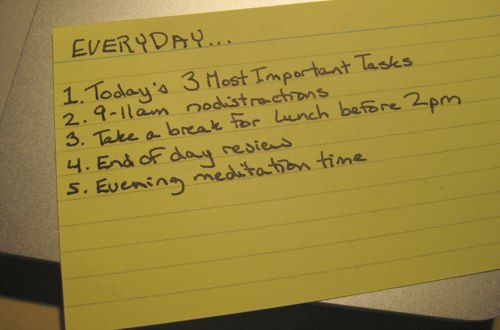Management for the self-employed
For years now I’ve been self-employed and I depend on my own motivation, scheduling abilities, etc. to make a living. I’m not a user of any fancy system or method for getting things done, and 95% of the time when I see elaborate advice on lifehacker.com or other productivity sites I know it won’t work for me.
Well today I came across a great post that approximates the system I use that I didn’t even think of as a system: The writing on the wall. Vero, at thatcanadiangirl.co.uk, says “It turns out that the best organization tools are a single sheet of paper and a calm brain.” I totally agree. This might not work if you bill clients hourly, but for less structured businesses like mine, something simple and reliable is all I need.
I don’t use her system exactly – but I do often start the day writing out my list of 5 or 6 things, and that list often includes 2 or 3 of the same things every day (Surprise: writing sessions is one of them). I write it on a post it, and stick it on my monitor, replacing the one from the day before. Whenever I feel lost or out of control, odds are I forgot to do this for the day. So I stop, make my list, and get back on track.
Here’s a photo of her list from her post – definitely head over there to read her full explanation of how her simple system works.


Thanks for the mention Scott, and glad the simple system pleases.
I think the single best addition I could make (especially early in the new year, where it’s a challenge to have a fully focused day, as I discovered today) is a widget that prompts me every 20-30 mins to ask whether I’m being productive, shaving a yak or downright wasting time. ;)
Wishing you a fantastic & productive 2009!
I’d think it’d be easy to find a widget like that – I don’t think I want one, but if I did it’d be easy to find. Even Outlook could be convinced to make half-hourly reminders.
Google provides:
Periodic reminder app
and
List of reminder apps people use
I know this is probably convoluting the coolness and simplicity, but I really like the ability to also keep track of what I want to do tomorrow, this week, next week and so on… But still keep it as straighforward as possible.
Here’s what I’ve been using that has been extremely helpful. I just reevaluate and rearrange it every morning for about 15 minutes:
http://www.flickr.com/photos/ritz/3054390357/
I try to never have more then 3-5 in any spot. And be very diligent to do them even if I have to stay late. Makes me a lot more aware of the things I’m estimating if I have to pull an all-night session if I mess up.
I love it!
Odd isn’t it that organizing your own (self-employed) time is much harder than organizing a staff of 50. It reminds me of an accountant friend who is perfectly reliable and diligent with respect to her clients, but fuzzy and unreliable regarding her own affairs.
I guess the difference is that when we organize others, we limit detail, consciously or not. When we organize ourselves, we can be hounded by detail. The persistent success of paper lists (and, for that matter, sketches and diagrams) may be that they limit our ability to name details.
I’ll add a tip to the others cited here: I use simple icons (triangles, circles, etc.) as prefixes to my item lines. These distinguish personal tasks — such as “take out the recycling”, “learn to program in Scala” — from business tasks. Yes, I carry them forward too, and I love crossing them out by scribbling them into squares.
One last comment: never underestimate the value of procrastination. Some tasks just have to fade away so that you can do what you really enjoy doing with the only time you have.
Interesting post Scott. I’ve just started using/testing Mark Forster’s new time management system called Autofocus. It is an interesting concept and he opened it up for beta testing recently. The concept’s reasonably easy to grasp and it doesn’t take much to start off, so it’s worth trying out.
Reassuring and surprising that, like your Guthrie post, you also feel the need to mark out each day a space to create.
I suppose it makes it more concrete if you set down a time for writing, rather than think “Oh, I’ll do some writing today” and prevents what’s important (the creating) from what’s not.
I will definitely try this process.